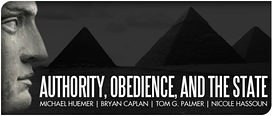I have just a few thoughts on Huemer’s latest reply: Even if he is right that states harm the poor more than they help them, it is not clear that, with so much at stake, we should reject all authority rather than consider alternative ways of modifying authoritarian institutions. More importantly, my example of a right against poverty is just an example of the rights states might protect. Second, there is little reason to think that capitalist corporations will do a better job of protecting the rights of those who lack resources to purchase protection than states. Finally, whether they (or Sam) can claim to efficiently address these rights depends on what is meant by “efficiency.” Sam might help a few people efficiently but not generally help the poor in the way states can help them—by solving large scale collective actions problems.
I have some more extensive thoughts on Palmer’s last post: Although I said that I do not think this is really the forum to talk about the details of my work on aid or poverty, I do want to say a few things to set the record straight since Palmer has been kind enough to take the time to look at some of my papers on the topic.
First, in my paper on aid and empirical evidence I not only talk about experimental studies of particular programs’ impacts (and suggest that this is generally the best evidence for establishing micro-level hypotheses as experimental studies have high internal validity), I also talk about some of the best macro level data that suggests many kinds of aid in general reduce poverty. Perhaps the best serious academic review of this evidence is here: On the Empirics of Foreign Aid and Growth . If Palmer is not convinced by this review, perhaps he should take the time to publish a paper explaining where it goes wrong in a peer reviewed journal.
Second, I believe he needs to offer hard evidence to establish his empirical presuppositions, for example, “People in poor countries are poor because they have low incomes; they have low incomes because they produce very little value etc.” Likewise, there is no way Palmer should be able to conclude from the mismanagement he’s seen in a few aid programs that in general “It’s a racket that enriches aid workers and does little of value for the poor.”
Third, I do not confuse poverty and inequality in my paper “Poverty, Inequality, and Free Trade” or suggest that inequality causes poverty—I just talk about both poverty and inequality (as well as free trade). Nor can Palmer conclude from the following sentence in my reply to his last post—“the current distribution of property rights globally is very unjust because it leaves people unable to meet their basic needs”—that I believe some people are poor because others are rich. Neither that sentence nor any of my published work suggests that inequality causes poverty.
Fourth, on trends in poverty and inequality: Palmer is right that inequality could be increasing for many reasons and that increasing poverty is only one such reason – I make that point in the article. I also survey some of the most rigorous evidence regarding the causes of inequality and argue that inequality may be increasing in part because the poor are getting poorer. Nothing he says addresses my argument (in part because the problems with PPP measures affect estimates of inequality as well as poverty).
Fifth, not only does correlation not prove causation but what has happened in the past may not happen in the future and, even if it is generally the case that liberty promotes growth, we should not let people starve if there is something we can do to help them, even if that requires restricting liberty a bit.
Sixth, it seems Palmer might accept my last point (and even my argument against Huemer) if he agreed that aid in general worked, but even if only some kinds of aid work, I do not see why he would resist giving such aid (and I think that if he took a serious look at the empirical evidence he should agree that states can at least do some good with aid). Some interferences with liberty may let us help the poor even if liberty in general is good for poverty reduction.
Seventh, Palmer misconstrues my argument against Huemer when he says: “The ‘right of necessity’ that Grotius and his followers invoked might be invoked for extreme want, but not for mere inequality.” I was not talking about inequality. I was talking about poverty.
Eighth, I don’t talk about resources or the resource curse at length in any of my work. So I do not think Palmer should conclude anything about what I would or would not say about the topic.
Finally, I do have some proposals that libertarians might like for addressing global poverty. One of these is here: http://academicsstand.org/projects/global-health-impact-project/. If my work on poverty is of interest to libertarians perhaps it would be worth having a discussion on the topic in a future issue of Cato Unbound.

